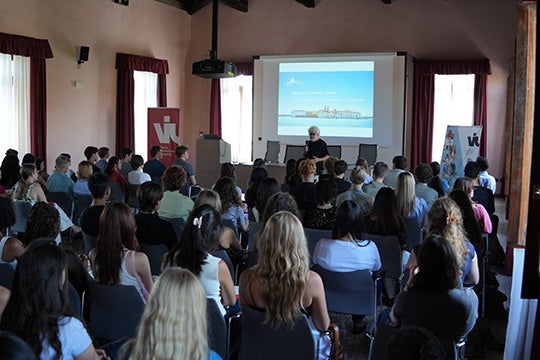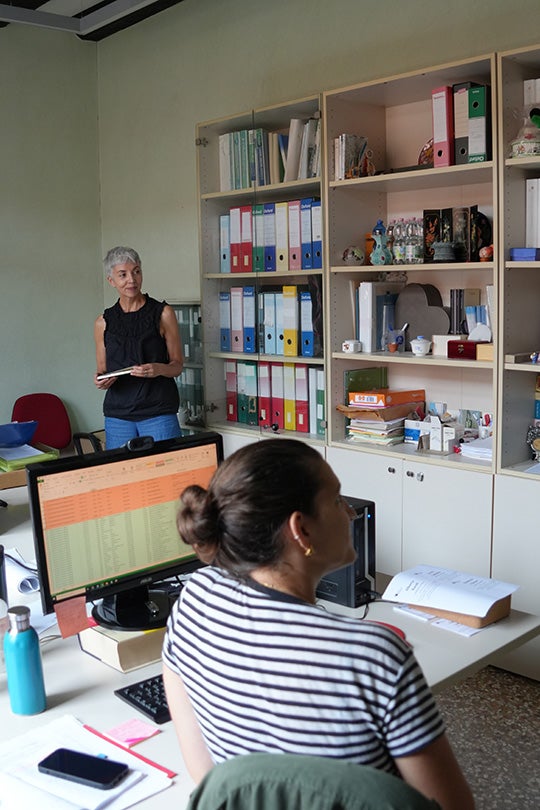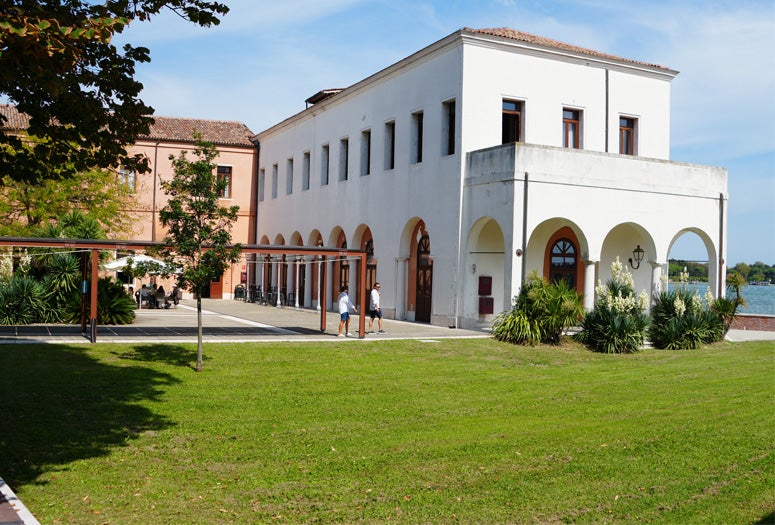When classes began at Venice International University (VIU) Sept. 8, a delegation from Rice University was there to witness it.
Led by Caroline Levander, vice president for global strategy, the group included Rachel Kimbro, dean of the School of Social Sciences; Abbey Godley, assistant dean for student programs in social sciences; and Matthias Staisch, associate teaching professor in political science and inaugural adviser for Rice’s new global affairs major.

Their visit to the San Servolo campus marked a milestone in Rice’s newly minted membership in VIU, a transnational consortium of 24 partner institutions dedicated to collaborative, interdisciplinary education. With a focus on pressing global challenges such as climate change, cultural heritage, public health and sustainability, VIU offers faculty a unique opportunity to teach internationally in immersive, globally integrated classrooms.
“Being on campus this week brought the vision of the Rice-VIU partnership to life,” Levander said. “We saw faculty co-teaching across borders, students from almost every continent in one classroom and an academic culture that values collaboration at its core. It’s a model that resonates deeply with Rice’s global strategy.”
This fall, VIU’s student cohort represents 27 nationalities and 17 universities across four continents — an embodiment of the transnational learning environment Rice faculty can expect to join.
Rice is now seeking faculty applicants to teach in VIU’s flagship globalization program, which is a semester-based undergraduate curriculum taught in English and open to students from all member universities. Each term, professors teach two courses over 15 weeks in Venice. VIU provides faculty housing, travel support and professional engagement throughout their stay, including access to local archives, museums and affiliated universities. The university also encourages faculty to connect across disciplines and institutions, often resulting in co-taught seminars, collaborative research and even book projects that grow out of conversations on campus.

“Social sciences faculty are already engaging with many of the topics central to VIU from global governance to sustainability to public health, so we’re excited by the opportunity to share that passion and expertise with students from across the world,” Kimbro said. “It’s a chance to extend the reach of our teaching and be part of an academic community that’s as globally minded as our research.”
The globalization program emphasizes global themes across three core areas: Venice and Italy, Cultures of the World and Global Challenges. Specialization tracks change each semester and include topics such as environmental humanities, science and society and history and memory. Faculty proposals should align with these areas and incorporate cross-cultural or comparative perspectives.
“The Globalization Program boasts a truly interdisciplinary curriculum,” Staisch said. “Professor Luca Pes, the program’s scientific director, works with each faculty member to ensure that courses are both accessible to subject novices and challenging for subject specialists. Students can choose from 25 courses, and they will be taught in small groups.”
Proposals for spring and fall 2026 courses are now open. Rice faculty may submit individually or in collaboration with faculty from another VIU partner institution. Selected faculty will join a global teaching cohort, contribute to curriculum design and gain access to the broader VIU network for potential research and scholarly collaboration.
“Executive director Orla McLaughlin and her team build a culture of community and care among students, faculty and staff from Day 1,” Staisch said. “With decades of experience running a global campus, they are uniquely attuned to the needs of students who left the comforts of home to pursue a global education.”
“Rice students are hungry for international learning experiences that go beyond study abroad,” Levander said. “VIU gives them the chance to learn in classrooms that reflect the complexity of the world they’re preparing to lead.”
To learn more about the Rice-VIU partnership, click here.

